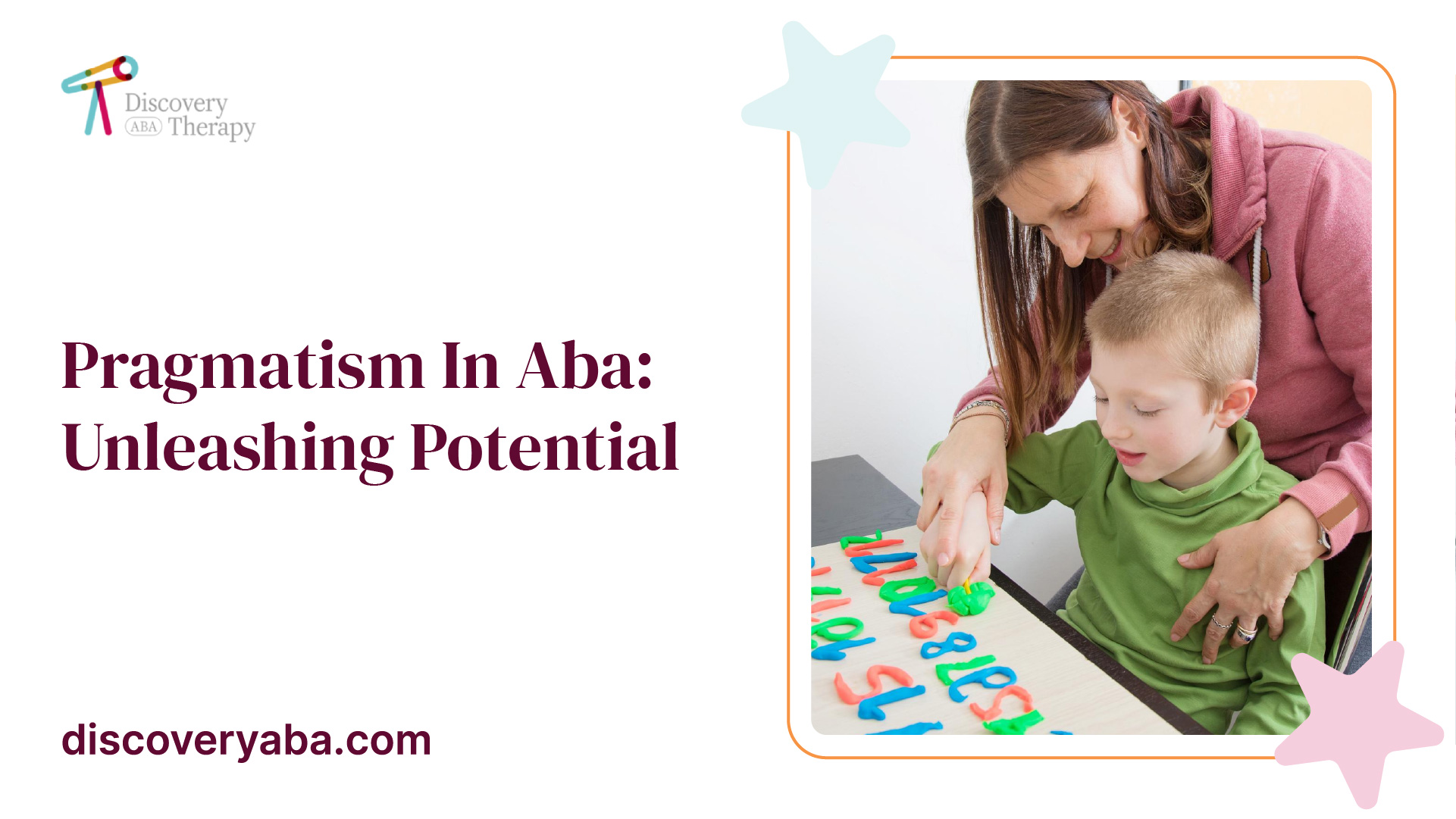Pragmatism In Aba: Unleashing Potential
Dive into the heart of Applied Behavior Analysis with Pragmatism – where it's not just about theories but practical, human-centered solutions. Explore a world where understanding meets action, creating meaningful change in behavior.

Understanding Pragmatism in ABA
In the world of Applied Behavior Analysis (ABA), pragmatism plays a vital role in transforming lives and promoting positive behavioral changes. Let's explore what Applied Behavior Analysis is and how pragmatism is integrated into this therapeutic approach.
What is Applied Behavior Analysis (ABA)?
Applied Behavior Analysis, commonly known as ABA, is a scientific and evidence-based approach that focuses on understanding and modifying behavior. It is widely used to support individuals with autism spectrum disorder (ASD) and other developmental disabilities.
Through ABA, behavior analysts assess behavior patterns and identify the underlying causes and functions of those behaviors. Based on this analysis, individualized treatment plans are developed to target specific skills and behaviors.

The Role of Pragmatism in ABA
Pragmatism in ABA refers to the emphasis on practical, real-life applications of behavior analysis principles. It focuses on teaching functional skills that are meaningful and relevant to the individual's everyday life. This pragmatic approach ensures that the skills learned during therapy can be generalized and applied in various settings.
By incorporating pragmatism into ABA therapy, individuals receive targeted interventions that directly address their unique needs and challenges. The ultimate goal is to enhance their overall quality of life and increase their independence and autonomy.
In ABA, pragmatism is reflected in various aspects of the therapy, such as the development of individualized treatment plans and the focus on teaching adaptive skills. These components are explored in detail in the following sections of this article.
In the next sections, we will delve deeper into the transformative power of pragmatism in ABA therapy, exploring the individualized treatment plans and functional skills development that are essential components of this approach.
Transforming Lives through Pragmatism
Pragmatism plays a pivotal role in Applied Behavior Analysis (ABA), contributing to the positive transformation of lives for individuals with autism. By implementing pragmatic strategies and techniques, ABA practitioners create individualized treatment plans that focus on functional skills development.
Individualized Treatment Plans
One of the key aspects of pragmatism in ABA is the emphasis on individualized treatment plans. Each person with autism has unique strengths, challenges, and goals. ABA practitioners take into account these individual differences and design personalized treatment plans tailored to meet the specific needs of each individual.
These individualized treatment plans are developed through careful assessment and observation. ABA practitioners conduct thorough assessments to identify the specific behaviors that need to be targeted and the skills that need to be developed. By understanding the unique needs of each individual, practitioners can create treatment plans that address their specific challenges and goals.
Functional Skills Development
Pragmatic ABA focuses on developing functional skills that are meaningful and relevant to the individual's everyday life. The ultimate goal is to equip individuals with autism with the necessary skills to navigate real-life situations and enhance their independence and quality of life.
Functional skills encompass a wide range of abilities, including communication, social interaction, self-care, and independent living skills. ABA practitioners work closely with individuals with autism to assess their current skill levels and identify areas for improvement. Through evidence-based interventions, such as discrete trial training and naturalistic teaching strategies, practitioners systematically teach and reinforce functional skills.
By focusing on functional skills development, ABA practitioners empower individuals with autism to actively participate in various aspects of daily life. These skills enable individuals to communicate effectively, build relationships, engage in self-care activities, and participate in their communities.
The transformative power of pragmatism in ABA lies in the individualized treatment plans and the emphasis on functional skills development. By tailoring interventions to meet the unique needs of each individual and focusing on skills that are relevant to their daily lives, ABA practitioners can make a significant positive impact on the lives of individuals with autism and their families.
The Pragmatic Approach in ABA Therapy
When it comes to Applied Behavior Analysis (ABA) therapy, the pragmatic approach plays a vital role in helping individuals with autism reach their full potential. This approach focuses on real-life situations and teaching adaptive skills, providing practical and meaningful interventions that can be applied to everyday life.
Focusing on Real-Life Situations
One of the key aspects of the pragmatic approach in ABA therapy is its emphasis on real-life situations. Instead of solely focusing on isolated behaviors, ABA practitioners incorporate the individual's natural environment into therapy sessions. By doing so, they ensure that the skills being taught can be readily applied in real-world settings.
For example, if a child with autism is learning social skills, the therapist may organize playdates or social outings to allow the child to practice and generalize these skills in a natural and meaningful context. This approach helps individuals with autism develop the necessary skills to navigate social interactions and daily routines effectively.
Teaching Adaptive Skills
Adaptive skills are essential for individuals with autism to function independently in various aspects of life. The pragmatic approach in ABA therapy places a strong emphasis on teaching adaptive skills that are relevant to the individual's specific needs and goals.
These skills can include self-care tasks such as dressing, grooming, and eating, as well as functional skills like money management, grocery shopping, and using public transportation. ABA therapists use evidence-based strategies to break down these skills into smaller, achievable steps, ensuring that individuals with autism can learn and apply them successfully.
By focusing on teaching adaptive skills, the pragmatic approach in ABA therapy helps individuals with autism become more self-reliant and capable of participating in everyday activities. This increased independence not only enhances their quality of life but also fosters a sense of confidence and empowerment.
In summary, the pragmatic approach in ABA therapy takes a holistic view of individuals with autism, recognizing the importance of real-life situations and adaptive skills. By incorporating these elements into therapy sessions, ABA practitioners can help individuals with autism develop the necessary tools to thrive in their day-to-day lives.
Benefits of Pragmatism in ABA
Pragmatism plays a vital role in Applied Behavior Analysis (ABA) and offers numerous benefits for individuals with autism. By focusing on real-life situations and teaching adaptive skills, the pragmatic approach in ABA therapy promotes generalization of skills, increased independence, and autonomy.
Generalization of Skills
One of the key benefits of pragmatism in ABA is the emphasis on generalizing skills across various settings and situations. ABA interventions that incorporate pragmatism aim to teach skills that can be applied not only in therapy sessions but also in real-life scenarios. This ensures that the skills learned are transferable and can be utilized in different contexts.
Through the pragmatic approach, individuals with autism are encouraged to practice and apply their learned skills in natural environments. This may include engaging in social interactions at school, participating in community activities, or using newly acquired communication skills with family members and friends. The focus on generalization helps individuals with autism to effectively utilize their skills beyond the therapy setting, promoting greater independence and integration into society.
Increased Independence and Autonomy
Pragmatism in ABA therapy also fosters increased independence and autonomy for individuals with autism. By focusing on teaching functional and adaptive skills, individuals can gain the necessary tools to navigate daily life more independently.
Through individualized treatment plans, ABA practitioners work closely with individuals and caregivers to identify specific goals related to independence and autonomy. These goals may include self-care tasks, such as dressing and grooming, as well as practical skills like meal preparation, money management, and transportation.
By breaking down these skills into manageable steps and providing targeted interventions, individuals with autism can acquire the necessary skills to become more self-reliant.
The pragmatic approach recognizes the importance of empowering individuals with autism to actively participate in decision-making and problem-solving. This approach promotes self-advocacy and enables individuals to have a greater sense of control over their own lives. As a result, individuals with autism can experience increased self-confidence and a greater sense of achievement.
Incorporating pragmatism in ABA therapy not only enhances the effectiveness of interventions but also empowers individuals with autism to lead more independent and fulfilling lives. By focusing on the generalization of skills and promoting autonomy, the pragmatic approach in ABA provides valuable tools and strategies for individuals to navigate the world with confidence.
Empowering Individuals and Caregivers
The pragmatic approach in Applied Behavior Analysis (ABA) not only focuses on transforming lives but also emphasizes the empowerment of individuals with autism and their caregivers. By adopting a collaborative approach and providing essential support, ABA practitioners aim to create a positive and inclusive environment for everyone involved.
Collaborative Approach
One of the key aspects of the pragmatic approach in ABA is the emphasis on collaboration. ABA practitioners work closely with individuals with autism and their caregivers to develop personalized treatment plans and set achievable goals. By involving all stakeholders in the decision-making process, a collaborative approach ensures that everyone's perspectives and insights are taken into account.
Through collaboration, individuals with autism and their caregivers become active participants in the treatment process. They have the opportunity to share their experiences, concerns, and goals, which helps shape the intervention strategies. This collaborative approach fosters a sense of partnership and mutual understanding between ABA practitioners and the individuals and caregivers they work with.
Support for Caregivers
Caregivers play a vital role in the lives of individuals with autism. ABA recognizes the challenges faced by caregivers and provides them with the necessary support to navigate the journey effectively. ABA practitioners offer guidance, resources, and training to help caregivers understand and implement the strategies and techniques used in ABA therapy.
Support for caregivers goes beyond providing them with the knowledge and skills to implement behavior intervention plans. ABA practitioners also offer emotional support, helping caregivers cope with the stresses and demands that come with caring for individuals with autism. By equipping caregivers with the tools they need, ABA empowers them to create a nurturing and supportive environment that enhances the overall well-being of the individuals they care for.
Caregivers can also benefit from connecting with support groups and other caregivers who are going through similar experiences. These networks provide a valuable platform for sharing insights, seeking advice, and gaining a sense of community. ABA practitioners may also facilitate or recommend such support groups to ensure caregivers have access to a strong support system.
By adopting a collaborative approach and providing comprehensive support, the pragmatic approach in ABA empowers both individuals with autism and their caregivers. This approach recognizes the unique strengths, challenges, and needs of each individual and aims to create an inclusive and supportive environment where they can thrive.
The Future of Pragmatic ABA
As the field of Applied Behavior Analysis (ABA) continues to evolve, the integration of pragmatism is shaping the future of ABA therapy. This forward-thinking approach focuses on real-life situations and the promotion of inclusion and community integration for individuals with autism. Let's explore two key aspects of the future of pragmatic ABA: advancements in ABA techniques and promoting inclusion and community integration.
Advancements in ABA Techniques
Advancements in ABA techniques are continuously enhancing the effectiveness and efficiency of therapy for individuals with autism. These innovations aim to provide tailored interventions that address the unique needs of each individual. By combining evidence-based practices with pragmatic principles, ABA therapists can create more impactful and meaningful interventions.
New techniques and strategies are being developed and refined to ensure that ABA therapy remains dynamic and adaptable. These advancements focus on individualized treatment plans, functional skills development, and the integration of technology to enhance learning and engagement. By staying up to date with the latest research and incorporating innovative techniques, ABA therapists can provide the best possible outcomes for individuals with autism.
Promoting Inclusion and Community Integration
Promoting inclusion and community integration is a key area of focus for the future of pragmatic ABA. The goal is to equip individuals with the skills and confidence to navigate various social settings and participate fully in community activities. By emphasizing adaptive skills and fostering independence, ABA therapists help individuals with autism become active members of their communities.
Inclusive practices involve collaborating with schools, community organizations, and other professionals to create supportive environments for individuals with autism. This collaborative approach ensures that the strategies used in ABA therapy are consistent across different settings, allowing for generalization of skills. Generalization refers to the ability to use learned skills in different contexts, which is a crucial aspect of promoting community integration.
By incorporating pragmatic principles into ABA therapy, individuals with autism can gain the skills necessary to participate in everyday activities, engage with peers, and become more independent. This focus on inclusion and community integration promotes a more holistic and well-rounded approach to therapy.
As the future of pragmatic ABA unfolds, it holds great promise for individuals with autism and their caregivers. Advancements in ABA techniques and the emphasis on promoting inclusion and community integration pave the way for a brighter future. By harnessing the power of pragmatism, ABA therapy continues to transform lives and empower individuals with autism to reach their full potential.
Summary
Let's embrace the very essence of this approach – the idea that it's not just about theories in textbooks; it's about real people, real challenges, and real solutions.
Pragmatism in ABA isn't a distant concept; it's a friendlier, more approachable guide to creating meaningful change. It's a reminder that understanding behavior is not an abstract pursuit but a practical endeavor, requiring tools that work in the messy, beautiful complexity of real-life situations.
So, as we wrap up, let's carry forward this spirit of pragmatism – the idea that our efforts are not confined to the pages of a manual but are woven into the fabric of everyday life. It's about making a positive impact, one small, pragmatic step at a time, creating a world where empathy, understanding, and effective solutions go hand in hand.
Sources
Find More Articles
Contact us
North Carolina, Tennessee, Nevada, New Jersey, Utah, Virginia
New Hampshire, Maine
Massachusetts, Indiana, Arizona, Georgia
.avif)

























































































%2520(1).jpeg)

